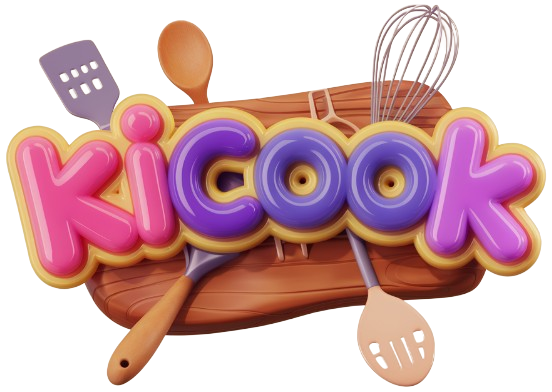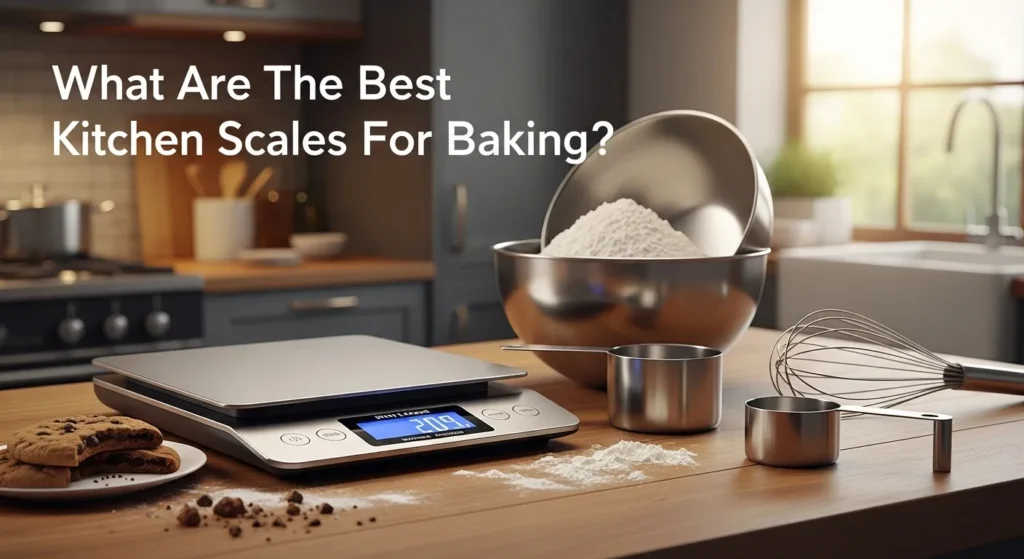I’ve spent countless happy hours in my kitchen, surrounded by flour clouds and the sweet smell of vanilla. Over the years, I’ve learned one undeniable truth: baking is a science. Unlike cooking, where a pinch of this and a dash of that can work, baking demands precision. That’s why I’m such a strong advocate for using a good kitchen scale. The question I get asked all the time is, “What are the best kitchen scales for baking?”
It’s a great question because the right scale truly is a baker’s secret weapon. It eliminates the guesswork of measuring cups, ensures consistent results every single time, and honestly, makes cleanup a breeze. After testing more scales than I can count, I’ve found that the best ones share a few key traits: accuracy, ease of use, and a design that just makes sense for a baker’s needs.
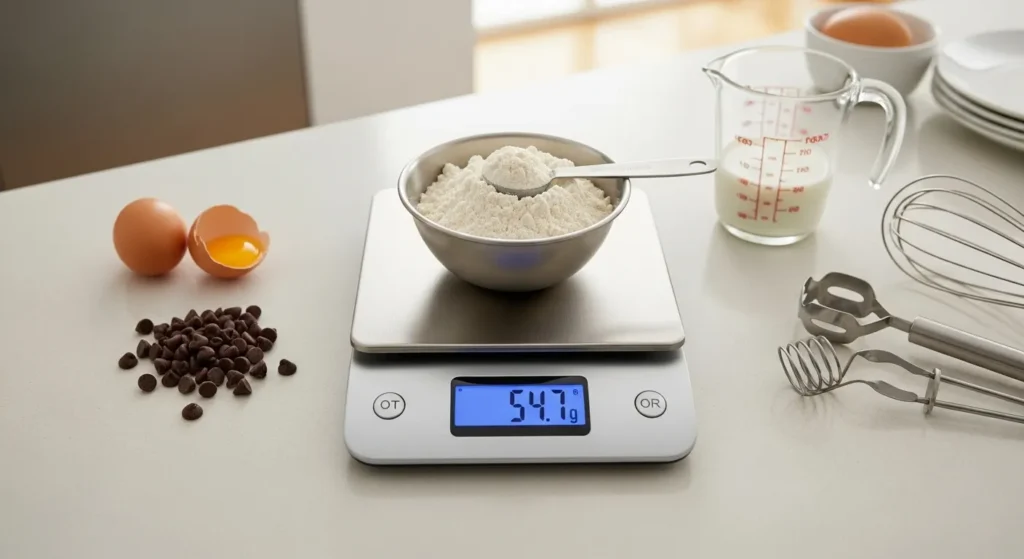
Why I Swear By a Scale for Baking
Let me tell you a quick story. I once made two batches of the same chocolate chip cookie recipe back-to-back. One I measured with cups, the other I weighed on my scale. The cup-measured batch was good, but they spread out a bit too much and were slightly denser. The batch made with the scale? Perfectly chewy, evenly shaped, and absolutely delicious. The difference was stark.
A cup of flour can vary in weight by up to 20% depending on how you scoop it—whether you spoon it in, scoop directly from the bag, or tap the cup to settle it. That variance can be the difference between a light, fluffy cake and a dense, tough one. Weight, measured in grams or ounces, is absolute. 150 grams of flour is always 150 grams of flour. This precision is what leads to reliable, professional-quality results in your home kitchen. It’s the single best thing you can do to improve your baking.
What Makes a Kitchen Scale Great for Baking?
So, what should you look for when you’re trying to find the best kitchen scales for your counter? Based on my experience, here are the non-negotiable features.
Accuracy and Precision: This is the most important factor. For baking, you need a scale that is accurate to at least one gram (0.05 oz). This level of detail is essential for small measurements like yeast, baking powder, or salt, which can dramatically affect your final product.
Capacity and Tare Function: A good capacity for a baking scale is around 5kg (11 lbs). This lets you weigh a large bowl of dough or a big mixing bowl without issue. The tare function (sometimes called ‘zero’) is your best friend. It allows you to place your bowl on the scale, reset the display to zero, and then add your ingredients one by one without doing any math. You can measure everything in one bowl, which is a huge time and dish saver.
Units of Measurement: The best kitchen scales will let you easily switch between units. Look for one that offers grams (g), ounces (oz), pounds (lb), and even milliliters (ml) for water and other liquids. As a baker, I work primarily in grams for its precision.
Display and Readability: A large, backlit LCD screen is a lifesaver. When your hands are covered in dough, you need to be able to read the numbers clearly, even if you’re working under low kitchen lighting or your body is casting a shadow.
Design and Usability: A flat, easy-to-clean platform is a must. A stainless steel or tempered glass surface wipes down in seconds. The scale should also have a stable, non-slip base to prevent any wobbling or accidents. I also prefer a slim design for easy storage in a drawer.
Extra Features: While not essential, some nice-to-have features include a auto-off timer to save battery life, a low battery indicator, and a overload indicator. Some modern scales even offer nutritional data or connect to apps via Bluetooth, which can be fun for tracking recipes.
Types of Kitchen Scales
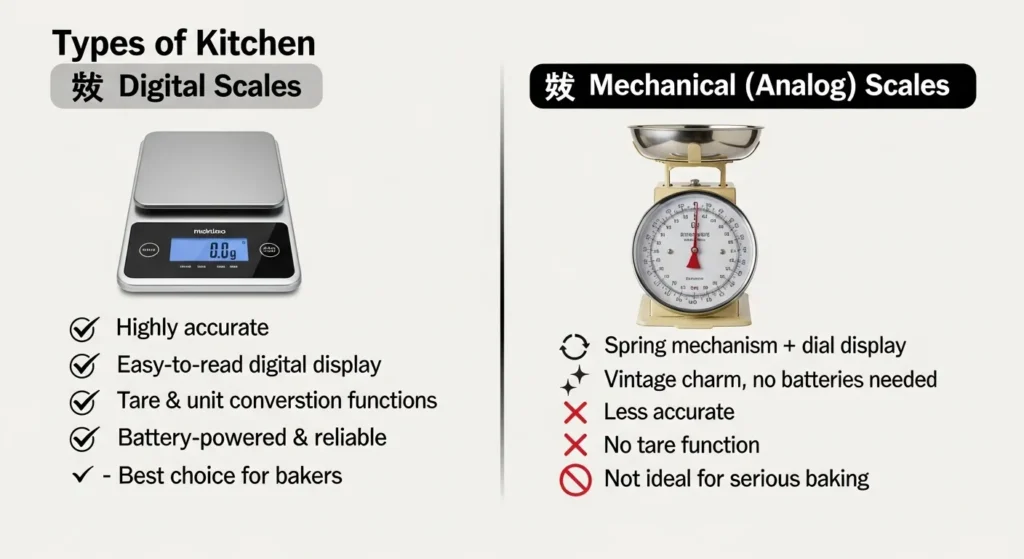
There are two main types you’ll encounter:
- Digital Scales: These are, in my opinion, the best choice for bakers. They offer superior accuracy, easy-to-read digital displays, and intuitive buttons for tare and unit conversion. They’re powered by batteries and are typically very reliable.
- Mechanical (Analog) Scales: These use a spring mechanism and a dial to show weight. While they have a certain vintage charm and don’t require batteries, they are generally less accurate and lack the handy tare function. I don’t recommend them for serious baking.
My Personal Recommendations for the Best Kitchen Scales
After all my testing, a few models consistently rise to the top. Here’s my shortlist.
1. The All-Round Champion: Escali Primo Digital Scale
This is my go-to recommendation for most home bakers and the scale I most often gift to friends. It’s affordable, incredibly reliable, and does everything you need it to do. It has a simple two-button operation (on/off and unit change), a large platform, and is accurate to 1 gram. It’s a no-fuss, workhorse scale that just gets the job done, time after time.
2. The Baker’s Best Friend: OXO Good Grips Food Scale with Pull-Display
This scale is a dream for bakers. Its brilliant design features a pull-out display. This means you can weigh a huge bowl that would normally block the screen, but you can just pull the readout toward you so it’s always visible. It’s a small design choice that makes a huge difference in usability. It’s also accurate, easy to clean, and feels very sturdy.
3. The High-Capacity Powerhouse: GreaterGoods Digital Food Scale
If you frequently make large batches of bread or pizza dough, a scale with a higher capacity is key. This model is great because it maintains good accuracy even at higher weights. It has a sleek design, a clear display, and is very user-friendly, all at a great price point.
4. The High-Tech Helper: Etekcity Food Scale with Nutrition Data
For those who love data, this scale can be a fun addition to your kitchen. Beyond basic weighing, it has a database of food codes you can enter to get nutritional information like calories and protein content. While I primarily use it for weighing ingredients, the extra feature is neat for those who are curious.
How to Use Your Kitchen Scale: A Simple Guide
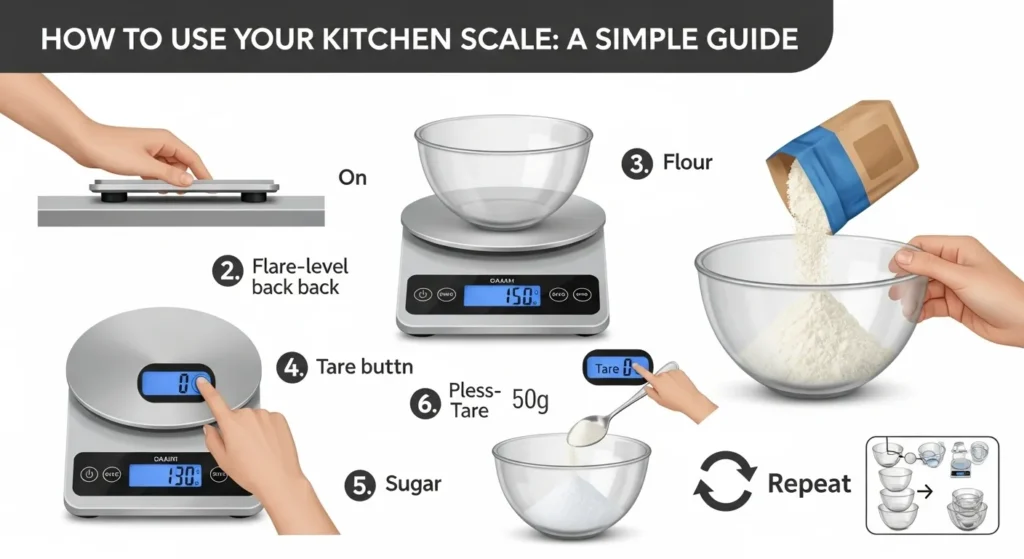
If you’ve never used one before, it’s wonderfully simple.
- Place your scale on a flat, level surface.
- Turn it on. Most will auto-calibrate to zero.
- Place your empty mixing bowl on the platform.
- Press the “Tare” or “Zero” button. The display should now read “0.”
- Add your first ingredient (e.g., flour) until you reach the desired weight.
- Press “Tare” again. The scale will reset to “0.”
- Add your next ingredient (e.g., sugar). Repeat until all your ingredients are in the bowl!
It’s that easy. One bowl, no mess, perfect measurements.
“A recipe has no soul. You, as the cook, must bring soul to the recipe.” – Thomas Keller
Frequently Asked Questions for What Are The Best Kitchen Scales For Baking?
Are kitchen scales really necessary if I already have measuring cups?
While you can bake with cups, a scale brings a level of accuracy and consistency that cups simply cannot match. It eliminates human error and is the standard tool used by professional bakers worldwide.
What is the best unit of measurement for baking?
Grams are the most precise and are used in most professional recipes. I strongly encourage baking with recipes that use weight measurements for the best results.
How do I clean my kitchen scale?
Always unplug or remove the battery first. Wipe the platform with a damp cloth and a mild detergent. Never submerge the scale in water, as the electronic components can be damaged.
My scale is giving me inconsistent readings. What’s wrong?
First, check that the batteries are fresh. Then, ensure the scale is on a completely flat, stable surface. Even a slight tilt can throw off the accuracy. Also, make sure nothing is touching the underside of the platform.
Can I weigh liquids on a kitchen scale?
Absolutely! This is a great use for a scale. Since 1 milliliter of water weighs 1 gram, you can easily measure water, milk, oil, and other liquids by weight, saving you from dirtying more liquid measuring cups.
“Baking is both an art and a science.” – Gail Simmons
Conclusion
So, what are the best kitchen scales for baking? The answer is the one that you’ll use—a scale that is accurate, easy to read, and fits your kitchen style. For me, starting to use a scale was a turning point in my baking. It took the frustration out of the process and filled it with confidence.
Whether you choose the budget-friendly Escali, the clever OXO, or another model that catches your eye, investing in a good kitchen scale is an investment in better baking. It’s a simple tool that guarantees your time and effort in the kitchen will be rewarded with something truly wonderful. Happy baking!
“Everything in baking is a formula. It’s a science.” – Sylvia Weinstock
